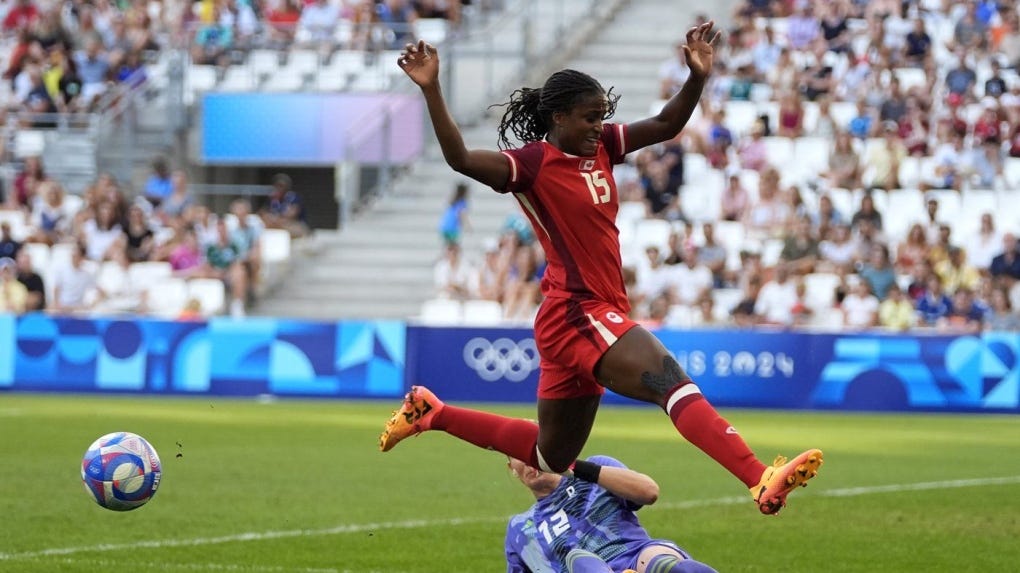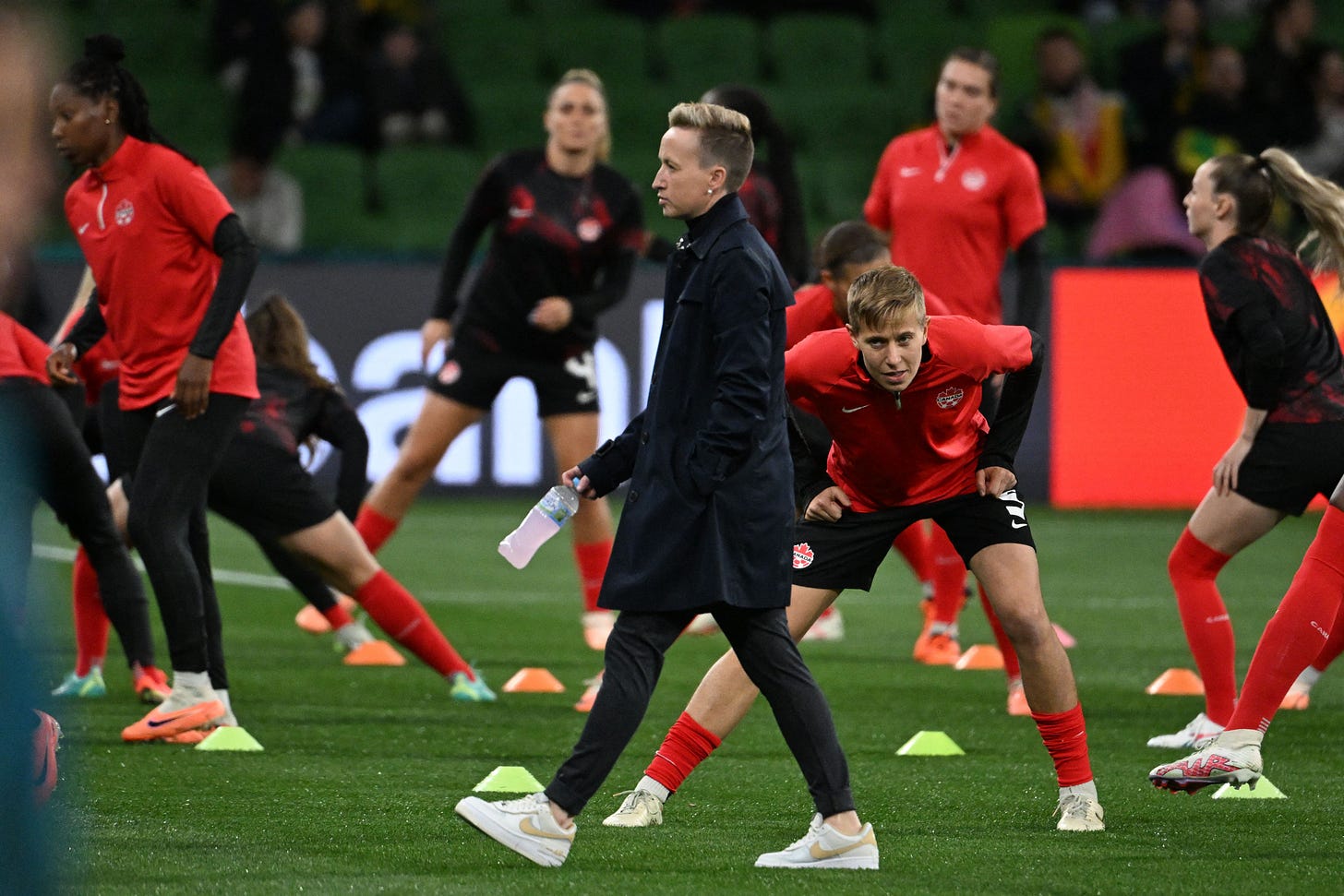Canada at the Olympic usually wrote history, what about this one?
Change is all about timing, and whilst not many could have predicted such events at the Olympics, change was inevitably coming for the better for Canadian soccer.
U.S.A, Brazil, Germany - is how the podium looked on Saturday at the Olympics, the first time that the top three did not include Canada since 2008.
The Olympic games have long been a canvas for the Canadian Women’s National team to write historical achievements, but Paris 2024 recorded an unforeseen series of events.
Women’s football at the Olympics operates differently to the men’s side of the competition. With youth requirements absent, the tournament acts as a senior international competition. This has fuelled criticism over the last two editions given the schedule congestion of senior football, rise of serious injuries, and the lack of enough high level competitions in youth football.
Regardless, Canada has figured out the recipe to find success at the Olympics over the last decade.
Their Paris journey ended in a quarter-final exit following a penalty shootout loss to Germany. Scoreless after 120 minutes, the game was decided by Ann Katrine Berger’s brilliance in saving two of Canada’s penalties, and converting her own. Yet, the 24 missed chances at goal was the real dagger for Canada’s exit.
That is not what all headlines have been about though, but rather it has been news of Head Coach Bev Priestman and her staff’s history of drone usage to spy on opponents. The scandal all came to light after Canada was caught operating a drone to spy on New Zealand’s training camp. Drone enthusiast Rebekah Stott was first to notice the loud device in the air, and flag it to French authorities.
Let’s break it all down.
The history
Canada qualified for their first ever Olympic in 2008, marking Christine Sinclair debut at the tournament who managed to score two goals. Les Rouge bowed out against the Americans in the next round, who eventually went on to capture gold.
When the 2012 games in London rolled around, Canada was ranked 7th in the world, the John Herdman era was underway, Sinclair was showing off her magic, and a set of exciting players were in the squad. Over 12 million Canadians tuned into the dramatic 4-3 semi-final heartbreak against familiar enemies, the USWNT, send the red and white jerseys to the third-place play-off game.
With fire in their belly, Canada wanted to podium. A historic 92nd minute strike by then 28-year old Diana Matheson against France secured bronze. Her first goal of the tournament achieved the nation’s first major tournament medal in football.
Four years later in Rio, the Canucks were bouncing off a disappointing home World Cup showing, but a new era was underway. A young Jessie Fleming, Kadeisha Buchanan, Ashley Lawrence and Deanne Rose became first-time Olympians when names into the 18 player squad. Combined with Sinclair, Matheson and Rhian Wilkinson, it seemed like Canada found a delicate mix between the vets and the rookies.
For the first time ever, Canada topped their Olympic group defeating Australia, Germany and Zimbabwe with then 22 year old Janine Beckie stealing the show. Conquering France, the Canucks fell to eventual winners Germany in the quarter-finals, a feeling they were all too familiar with. It did not matter, because Rose and ‘Sincy made sure the bronze was theirs once again sending heartbreak to Brazil.
Just appointed into her position months before the Tokyo Olympics, Priestman said, “We definitely need to change the colour of the medal.” The only way to back such statement up was that Canada had to make the final, something they hadn’t before.
COVID was in full swing, no crowds, hot weather, new head coach, and the relentless mindset of wanting to make history.
Two draws and a win in the group stages meant Canada had a shaky start finishing second in the standing. An ugly and slow showing against Brazil was determined by a penalty shootout. Then came the Americans who had historically gotten the best out of this fixture.
Fleming converted from the spot for the sole goal, and indeed Canada was now one win away from claiming gold. Continuing the streak of moving on from penalties, Steph Labbé masterclass versus Sweden meant Les Rouges left Japan as no.1, with a different colour medal around the necks.
Ripple effect
Three consecutive podium finishes, more eyes on the team than ever, a well respected young head coach, and players taking their professional career to Europe’s biggest clubs was the post-covid feel.
The 2012 achievement sent a message to grassroots clubs across the country to invest more and build up. The 2016 dominate run inspired youth that are the rising stars of the current team. Olivia Smith was still 12, Jade Rose was still in middle school, and Jordyn Huitema was still playing for the U17.
Oddly enough, there was no substantial effort from Canada Soccer or any major organization to create a professional women’s soccer league in Canada.
There was federation fall-outs with the players, pay disputes, and athletes asking for what they deserve.
The 2023 World Cup group-stage exit was a wake up call to plenty of what had occurred over the last few years with the CanWNT. But once again, the Olympics was one year away, and the focus was turned onto that quickly.
So, Paris.
Headed into the France with a winning streak after a successful home send off, Canada spent their preparation camp in sunny Sevilla, Spain. There, CanWNT won two practice friendly games against Nigeria and Australia, trained every day, took occasional dives into the pool for relaxation, and got fitter for the gruelling schedule ahead. Indeed, it was too good to be true.
Drawn into arguably the “easiest” group, Canada had to take on New Zealand, France and Colombia. Two days before the opening game, a drone scandal erupted, questions were fielded, and the status of the team was up in the air. Denying she directed assistant coaches Joey Lombardi and Jasmine Mander to fly the drone, Priestman voluntary withdrew her presence from the touchline for the game noting the integrity of the program.
Canada went on to win 2-1, but the talk was about the news that followed. Launching multiple investigations, FIFA placed Priestman and her two other coaches on a 1 year football-related suspension, handed CS a $300k fee, and gave the team the prize of relegation with a bow.
The team was hit with a six point deduction which meant the Canadians had to win their remaining two games if they had any hope of getting out the groups. That, they did. In the stadium, on the pitch, 18 players fought, battled, and showed their best self against many odds.
Sleepless nights, days filled with confusion, dealing with the feeling of betrayal, contemplating their stay, and punching walls were the events occurring in the hotel. Extra coaching and mental health support staff were flying in from Canada to assist in the chaos that was so hard to contain.
Vanessa Gilles’ two winning goals made the excitement of the fans back home, also so hard to contain.
The journey came to an end against Germany, who would go on to win bronze by defeating Spain in the play-off match. Exhausted after a 120 minutes, the players did not shed their tears alone on the grass. Instead, they comforted each other in groups, attempted to console Lawrence and Leon who missed from the spot, and hugged the staff. The players made it clear they were playing for each other which meant the display of agony also happened together.
“I am incredibly proud of our team and what we have overcome. Though the outcome wasn’t what we had hoped for, we can hold our heads high, knowing what we have achieved.” First time Olympian Cloé Lacasse wrote on her IG.
“Obviously not how we wanted the Olympics to end but what a ride it has been. Proud of this group and forever thankful for everyone who helped us and supported us through it all“ Vanessa Gilles wrote on social media.
Those were of some of the few released player statement following the conclusion of the 2024 Olympics.
Fans back home were proud of the team who had to overcome the consequences of their coaches’ dishonour, and the uninspiring news resulted in inspiring performances.
Moving forward.
The New Zealand camp may have thought they discovered a drone, but in reality they unraveled an entire scheme happening at Canada Soccer, and the house must be cleared now.
In some ways, this comes at a good time given where the nation stands in the sport.
New CEO and General Secretary Kevin Blue, who was appointed in February, has added a fresh level of transparency the federation has been needing for many years now. Hiring Jesse Marsch to take over the men’s national team after the departure of Herdman and co., gave the group of players a fresh and strong start.
Blue is known for his ability to fundraise at his previous job as Chief Sport Officer of Golf Canada and he has has already translated that into the soccer world. If anything, the new CEO is equipped to deal with this mess and will not be afraid to take the tough, yet appropriate action.
Priestman has risen through the ranks at Canada Soccer managing various youth teams, had a stint as the assistant coach, and worked with many up and coming coaches in her role as CanWNT head coach. Her wife, Emma Humphries, a Kiwi native, currently manages the U17 team. Mander, one of the suspended coaches, manages the U15 squad. Lombardi, the staff member caught operating the drone, is the Ontario National Development Centre Director among a few other roles across the country.
Priestman and her staff have their fingerprints all over the program, that is known and out in the open. The task at hand is finding out who is complicit, who is operating and building on a rotten coaching culture, and who has put the program at risk before. Regardless of how many individuals come out as part of this, there will be many that should leave Canada Soccer. A deep house cleaning will happen.
The Northern Super League, Canada’s first ever professional women’s soccer league is set to launch in April of 2025. There is huge belief the new set up will develop talent, provide professional opportunities for many Canadians, and build a sustainable pipeline to the CanWNT. In this process, many coaches are being pulled for the national team system, where had this scandal come out when many of those coaches are managing clubs, the ripple effect would have been ugly.
For this to happen now, all the women’s NT groups can start from fresh, perhaps something they have been calling for, for some time. The NSL will think about adding a “drone back-round check” to the coaches that will come into the league, re-assuring the integrity of the sport.
Change is all about timing, and whilst not many could have predicted such events at the Olympics, change was inevitably coming for the better for Canadian soccer.









